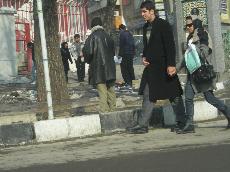 Sara Afzal
Sara AfzalAs we get inside an old taxicab, the smell of exhaust instantly hits me. The driver speeds down the crowded traffic of Tehran, Iran, without any recognition of street lanes. My cousin and I discuss my return flight to Boston, and suddenly the cab driver intervenes.
“Are you from America? Good. Get away from these Mullahs,” he said.
I am hardly surprised by his disdain for the Iranian government, a theocracy known for its Islamic conservatism promoted by President Mahmoud Ahmadinejad and led by “Mullahs,” or Islamic clerics. The majority of Iranians do not support the Islamic Republic of Iran and retaliate against government restrictions in the privacy of their own homes.
Whether it’s watching MTV on satellite broadcast, or hacking into censored Internet sites like Facebook or Myspace, my cousins in Iran have found ways to access mainstream culture. With my family’s home clad with the newest flat screen TV, it’s hard to believe the world outside the home represents a revival of strict Islamic law.
During my three-week visit to Iran to see my family, my personal safety was never an issue. Islamic law is enforced by the Iranian Revolutionary Guard Corps and police, but did I ever interact with them? The answer is no.
Islamic law is strictest toward Iranian women, who are required by law to wear the hijab, or head and body covering. Lack of proper attire could result in arrest. However, that does not mean that all Iranian women comply with wearing the traditional black sheet-like hijab.
The majority of young women wear a full face of make-up, colorful headscarves with half of their hair exposed and very tight overcoats. Although the Iranian government has recently cracked down on this “un-Islamic dress,” women continue to sport the newest fashions. Iranian women are risking being fined or arrested by the police, but that is a chance they are willing to take.
Also, many un-married couples risk arrest for being in public together. Couples must be able to prove their marital status if questioned by police.
I learned this from my cousin Crystal, a college student in Iran. Although Crystal has to worry about wearing a headscarf, I realize that we really aren’t that different. We are both college students who want to get a good education and have fun with our friends.
Because my cousins have to subtly retaliate against dating restrictions, dress codes and censorship, I was surprised about how easily we relate to each other. I shouldn’t be surprised, since they are my family. And yet, after four years of constantly hearing negative news about Ahmadinejad, I had a skewed perception of Iranian society.
I had forgotten the comfort of seeing my relatives, the warmth of speaking Farsi, the smell of kabaab, the sound of Middle-Eastern music and the beautiful sight of the Alborz Mountains peaked with snow. The Mountains are a striking background to the skyscrapers that house most of the seven million Iranians in Tehran.
Tehran looks comparable to any American city. There are Internet caf’eacute;s, coffee shops, fast food restaurants and movie theatres. My cousin Mohammed has the newest Samsung cell phone, a model that has yet to reach the U.S. Tehran is currently developing a new metro system.
However modern the city is becoming, tradition still exists. Going to a bazaar, or open-air market, was my favorite experience. Bargaining technique is necessary. My cousin Neda has honed bargaining to the point that when she walks away from a price, the merchant will beg her to come back. Following her lead, I successfully bargained, and one merchant even said, “What town are you from that you are such a firm bargainer?” It was nice to be “in” on the bazaar culture.
Being part of Iranian and American culture is a duality I enjoy, but I would not say it is always a comfortable one. In America currently, being Iranian has a negative connotation – mostly because of the Iranian government. The Iranian people are unfairly associated with a conservative government that the vast majority does not support. In American democracy, we believe that government represents the people, but that is not the case in Iran.
I wish my relatives in Iran could enjoy the freedoms I do in America. Regardless, they are genuinely happy with their lives. They have found a way to cope with the restrictions of the Iranian government. However, my family wishes that Ahmadinejad would focus on domestic issues, such as the plummeting economy, instead of endorsing a nuclear program.
Ahmadinejad may be the face of Iran here, but this misconception hides the true Iran: a rich, family-oriented culture where everyday life is about more than just wearing a headscarf.
Sara Afzal is a UMass student.






